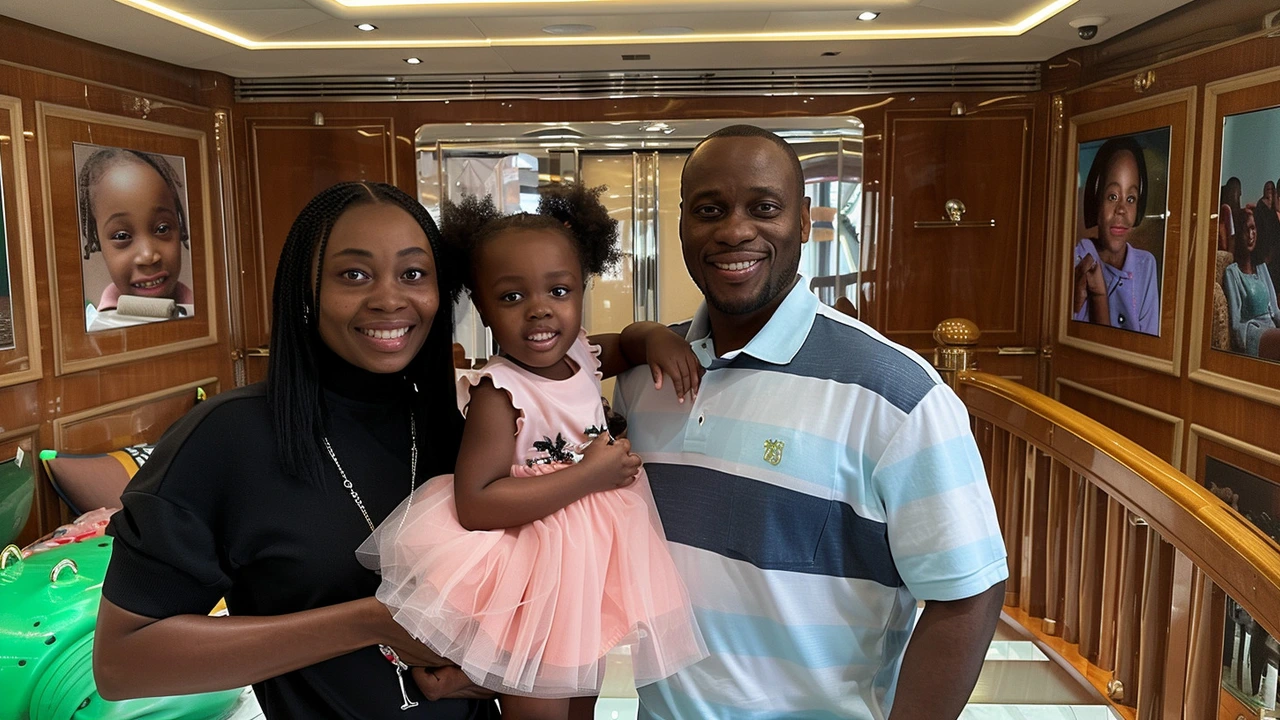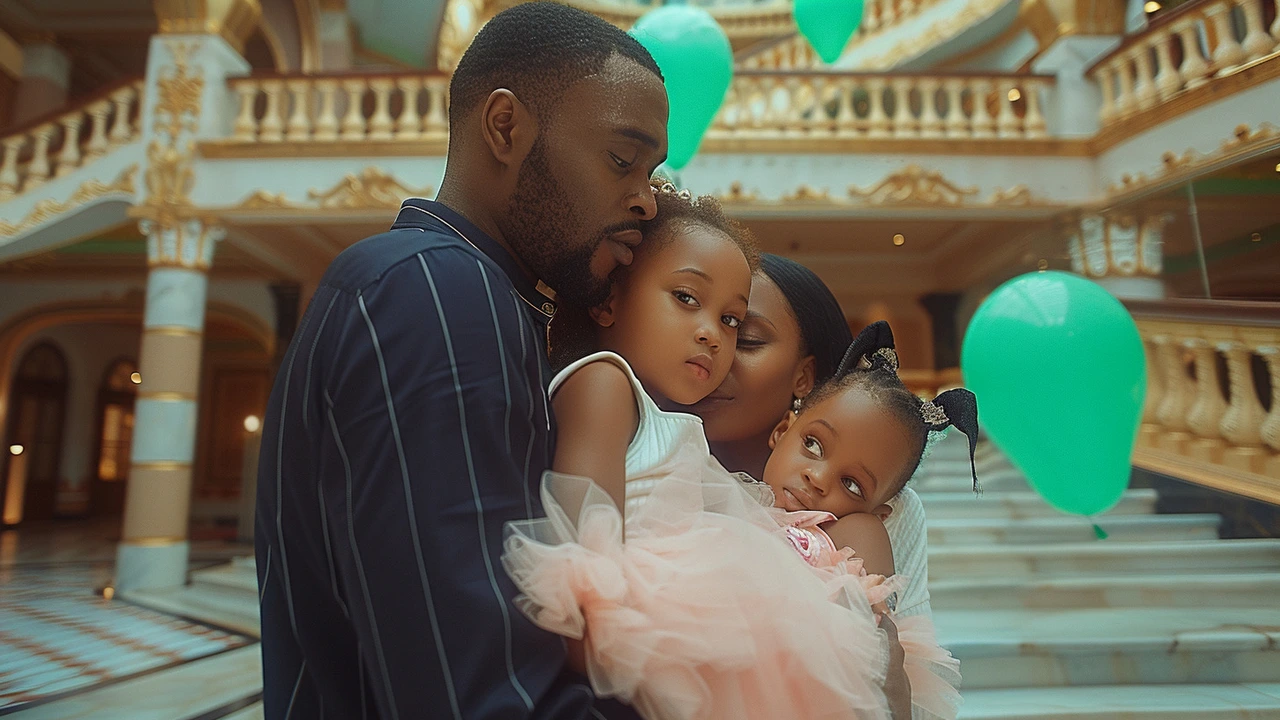Sophia Momodu Responds to Davido's Custody Battle
The legal tussle between Nigerian music icon Davido and Sophia Momodu, mother to his daughter Imade, has taken a bitter turn. On April 17, 2024, Davido, through his lawyers Olaniyi Arije and Okey Barrah, filed a lawsuit seeking joint custody of their nine-year-old daughter. The suit includes serious accusations against Momodu, alleging cruelty and unreasonable demands.
According to the lawsuit, Davido asserts that Momodu refused a lavish N200 million apartment in Oniru, Victoria Island, Lagos, intended for Imade's welfare. Additionally, he claims Momodu demanded an $800 monthly allowance for a nanny, a figure he deems unreasonable. However, Momodu has vehemently denied these allegations. She argues that her refusal was never about denying Davido access to their daughter but rather about rejecting his advances towards her personally.
Momodu's Denial and Counterclaims
Momodu provided detailed rebuttals to Davido's claims, clarifying that she has never refused him access to Imade. She further disclosed that Davido had been financially supportive during specific periods between 2014-2017 and 2020-2022. This support included paying for Imade's school fees, rent, and living expenses. Yet, Momodu argued that Davido has been largely absent from Imade's life for over two years, lacking engagement even during special occasions.
Adding fuel to the fire, Momodu accused Davido of failing to upkeep his financial responsibilities since his last period of support. According to Momodu, Musicians like Davido wield significant influence and resources but can sometimes neglect their duties towards their children post fallout. She also pointed out that Davido resorted to emotional manipulation, reportedly threatening to make her life miserable if she did not succumb to his intimate demands.
A Call for Formal Co-Parenting
In stark contrast to Davido's claims, Momodu revealed that two years ago, she initiated legal proceedings aimed at creating a formal co-parenting agreement. However, her efforts did not receive cooperation from Davido and his legal team. This push for formal structure highlights how modern co-parenting often necessitates clear legal frameworks to ensure fair responsibilities and engagement from both parents.

The Court of Public Opinion
The legal feud between Davido and Momodu has not only surfaced in legal documents but has also spilled over into social media, drawing widespread attention and varying opinions from fans and the public. The online discourse ranges from staunch supporters of Davido to those rallying behind Momodu, reflecting Nigeria's deeply divided perspectives on gender roles, parental responsibilities, and the influence of celebrity status on personal lives.
Davido, known for his chart-topping hits and flamboyant lifestyle, receives both adulation and criticism in equal measure. Critics argue that his public persona often overshadows his role as a responsible father, while supporters feel that Momodu may be leveraging their child to gain undue advantages. Conversely, supporters of Momodu emphasize the importance of accountability and emotional presence in fatherhood, particularly amidst high-profile separations.
Understanding the Legal Framework
Family law experts often underscore the complexities involved in custody battles involving high-profile individuals. The Nigerian legal system, like many others, prioritizes the welfare of the child above all else. Yet, cases involving celebrities frequently attract a maze of public interest, media scrutiny, and personal biases, making it challenging to separate facts from sensationalism.
In Nigeria, joint custody arrangements require both parties to demonstrate their capability to provide a stable environment for the child. This involves financial stability, emotional readiness, and a willingness to cooperate. As the case continues to unfold, both Davido and Momodu will need to present compelling arguments to convince the court of their commitment to Imade's well-being.

Broader Implications on Celebrity Custody Battles
This case between Davido and Sophia Momodu is a stark reminder of the broader issues affecting celebrity co-parenting dynamics. Fame, wealth, and public scrutiny can complicate what are already sensitive and emotionally charged situations. The case serves as a mirror reflecting societal attitudes towards fatherhood, the rights of single mothers, and the responsibilities that come with parenthood irrespective of social status.
Observers hope that this dispute can be resolved amicably, setting a precedent for other high-profile custody cases. Ideally, the focus should be on the child's needs, ensuring that Imade grows up with the love and support of both parents despite their differences. As more details emerge and the court proceedings continue, the public will be watching closely, hoping for a resolution that benefits Imade the most.
The Path Forward
While legal battles often cast shadows over the individuals involved, they can also pave the way for new understandings of parental responsibilities. Davido and Momodu’s case is a call to reflect on how separated parents can still collaborate effectively for their child’s benefit. It is a narrative that, at its core, calls for empathy, fair judgment, and the higher good of the child.
In navigating this tumultuous path, both parties have an opportunity to demonstrate maturity and a genuine commitment to their daughter’s future. Regardless of the court’s decision, the ultimate goal remains clear: to provide a nurturing and supportive environment for Imade, ensuring that she thrives despite the complexities surrounding her parents' relationship.


Comments (9)
Ah, the saga of celebrity custody-nothing says “high art” quite like a courtroom drama that doubles as a reality‑TV episode. One could philosophize that the true battle is not over who gets Imade’s bedtime stories, but over who gets to curate the public narrative. The legalese is merely a veneer for ego‑inflated posturing; the real stakes are the child's emotional ecosystem, which unfortunately gets reduced to a Twitter thread. If only the parties could channel their creative energies into a collaborative parenting plan rather than a lyric‑laden litigation, perhaps the world would witness a different kind of masterpiece.
Yet here we are, watching Davido’s legal team draft verses of accusation while Momodu pens rebuttals that read like a manifesto. The irony is almost delicious: the man whose beats move crowds cannot seem to march in step with his parental responsibilities. Perhaps the next single he drops will be titled “Custody Blues,” featuring a chorus of court clerks. In any case, the public will continue to dissect every clause as if it were a hidden track on an album.
It is evident that parental duty transcends fame and fortune.
Esteemed members of the public discourse, permit me to articulate a measured appraisal of the prevailing custody contention between Mr. Davido and Ms. Momodu. It is incumbent upon us to recognize that the jurisprudential framework governing such matters is predicated upon the paramount welfare of the minor, Imade, rather than the sensationalist appetites of tabloid media. The plaintiff’s allegations, albeit couched in emotive language, ostensibly seek to establish a narrative of paternal neglect that is regrettably unsubstantiated by concrete financial records. Conversely, the defence’s repudiation avows a history of intermittent pecuniary contributions that, while generous in episodic intervals, fail to constitute a sustained fiduciary commitment. One must acknowledge that the request for a N200 million domicile, albeit extravagant, is not per se indicative of custodial inadequacy, but rather a reflection of divergent expectations concerning material provision. Moreover, the demand for an $800 monthly stipend for a caretaker, when contextualized within Lagosian economic parameters, appears proportionate and not unreasonably burdensome. It is further pertinent to highlight that the assertion of emotional manipulation, although grievously serious, remains within the realm of allegation absent corroborative testimony. The legal counsel representing Mr. Davido, notably Messrs. Arije and Barrah, have demonstrated commendable diligence in articulating the plaintiff’s position, yet their rhetoric occasionally drifts toward theatricality. Both interlocutors would benefit from engaging in a mediated co‑parenting workshop, thereby reducing reliance on adversarial litigation. Such an approach could model constructive conflict resolution for their progeny. Furthermore, transparency regarding financial disbursements would alleviate allegations of misappropriation. In contrast, Ms. Momodu’s counter‑claims are suffused with a rhetoric of victimhood that, while compelling, may obscure objective analysis. The court, therefore, is tasked with dissecting these competing narratives with scholarly impartiality, eschewing any predilection for celebrity status. It would be remiss, indeed, to allow the public’s proclivity for melodrama to eclipse the sober adjudication required. Ultimately, the jurisprudential outcome should not be a victory for either celebrity, but a triumph for the child's future. In conclusion, while both parties possess legitimate concerns, the ultimate resolution must be anchored in empirically verified data, unwavering legal precedent, and an unwavering focus on the child’s holistic development. May the adjudicative process proceed with the decorum befitting a matter of such societal import.
While the preceding exposition employs commendable legalistic ornamentation, one might interrogate the epistemological underpinnings of equating fiscal magnitude with parental competence. The discourse, albeit erudite, tacitly perpetuates a paradigm wherein monetary metrics eclipse affective attunement, a notion that, from a developmental systems perspective, warrants critical deconstruction. Moreover, the invocation of “co‑parenting workshops” presupposes a baseline of mutual goodwill that, in practice, is frequently attenuated by power asymmetries inherent in celebrity dynamics. Consequently, the analytical framework should integrate psychosocial variables, such as attachment security indices and caregiver sensitivity scales, to holistically assess custodial suitability. In sum, the synthesis of financial stewardship with emotional availability remains the fulcrum upon which the child’s welfare pivots.
Seeing both sides lay out their points reminds us that even big names can learn to listen. It’s a chance for them to put Imade first and maybe find a middle ground that works for everyone. If they can focus on her happiness instead of the headlines, there’s hope for a better outcome.
One must, with the utmost decorum, acknowledge the sheer novelty of a pop star negotiating child support as if drafting a feature‑film synopsis. The lexicon of “lavish” apartments and “unreasonable” allowances, while flamboyant, merely masks the underlying fiduciary discourse that ought to be grounded in statutory guidelines rather than celebrity bravado. In this theater of public opinion, the terminology employed by both parties serves as a strategic semiotic device, redirecting focus from substantive parental responsibility to sensationalist dramaturgy. Thus, while the vernacular may glitter, the substantive obligations remain steadfast and unembellished.
Indeed-the situation, as presented, is fraught with complexity!!! Yet, one cannot ignore the fact that the public narrative often amplifies minor details-such as the $800 nanny stipend-into colossal controversies!!! It is crucial, therefore, for both parties to adopt a pragmatic approach, focusing on Imade’s everyday needs rather than succumbing to media amplification!!! The legal arena should, in my view, prioritize clear, enforceable agreements over theatrical posturing!!!
Man, this whole thing feels like a blockbuster drama that never got a script! Davido’s lawyers throwing legal punches, Momodu firing back with rebuttals-it's pure soap opera material! But beneath the hype, there's a kid whose life is being turned into a headline. If only they could drop the theatrics and just co‑parent like normal humans, maybe we’d all be better off.
Hey, you nailed it-turns out celebrity drama isn’t a genre, it’s a lifestyle. Keep the sarcasm sharp, but maybe channel that energy into coaching the stars to actually communicate like adults. If they can learn to put Imade’s needs before the spotlight, that’s a win for everyone.